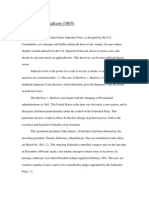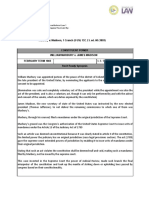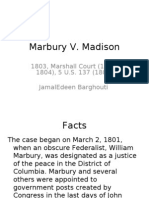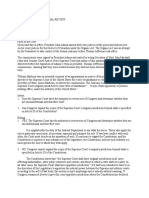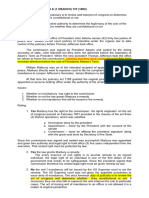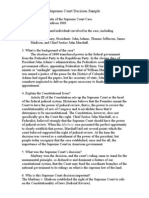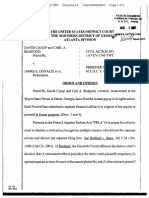Marbury V Madison
Marbury V Madison
Uploaded by
api-261009456Copyright:
Available Formats
Marbury V Madison
Marbury V Madison
Uploaded by
api-261009456Original Title
Copyright
Available Formats
Share this document
Did you find this document useful?
Is this content inappropriate?
Copyright:
Available Formats
Marbury V Madison
Marbury V Madison
Uploaded by
api-261009456Copyright:
Available Formats
Marbury v.
Madison (1803)
Name:
But the President Said I Could Be a Judge!
In 1800, President John Adams ran to be re-elected as president, but he
lost to Thomas Jefferson. During his last weeks in office, Adams
appointed a bunch of men to be justices of the peace in the District of
Columbia. Each man would receive a paper commission that was signed
and sealed. The commissions were prepared, but they were not sent
before Adams left office. When President Jefferson took over, he refused
to send them.
One man, William Marbury, was upset. He wanted to be a judge! So he
asked the United States Supreme Court to issue a legal order called a writ
of mandamus (man-DAY-mus). In this case, the writ would have required
Marburys commission to be delivered.
The Argument
James Madison was Jeffersons
Secretary of State. He was told
not to deliver the commissions.
Did you notice that Marbury didnt start in a regular, local court?
He started at the Supreme Court. Normally, that would be
backwards. But in 1789, Congress had passed a law saying
people could start at the Supreme Court if all they wanted was a
writ of mandamus. Marbury argued that he was entitled to the
writ because his commission had already been created. He also
argued that the Supreme Court had the power to issue the writ.
The Decision
The Supreme Court agreed that Marbury had a right to receive his
commission, but disagreed that the Court had the power to issue
the writ. Why? Because the Supreme Court gets its power directly
from the Constitution, and the Constitution says only certain kinds
of cases can start at the Supreme Court. That meant the 1789 law
passed by Congress was unconstitutional. Congress did not have
the power to allow more kinds of cases to start at the Supreme
Court. Therefore, the Supreme Court said it could not help Marbury
get his commission.
So What?
William Marbury never did receive
his commission. Photo courtesy of
Maryland Historical Society.
Believe it or not, this is considered one of the most important
cases the Supreme Court has ever decided. Thats because it
was the first time the Supreme Court struck down an act of
Congress for being unconstitutional. The idea that the
Supreme Court has the final say about what is constitutional is
called judicial review. Judicial review lets the judicial branch
do two things: 1) interpret the Constitution and decide what it
means, and 2) stop the executive and legislative branches
from doing things that go against the Constitution.
Thanks to Marbury v. Madison, today the
three branches of government are equal.
The decision in Marbury v. Madison helped cement the judicial
branch as equal with the other two branches of government by
giving it equal power.
Reading
Marbury v. Madison (1803)
Name:
Supreme Court Strikedown: End of the Line for a Law? The Supreme Court may declare a law
unconstitutional, but that doesnt always mean the whole law is dead. Congress can change the law,
repeal the law and pass a new one, drop the subject, or even amend the Constitution itself!
First, read about four laws the Supreme Court has struck down. Then see if you can correctly guess what
happened next! When youre done, match the letter of each law to its answer below. (Heyno peeking!)
___
___
___
___
Activity
You might also like
- Amendments Worksheet27Document2 pagesAmendments Worksheet27api-3150597910% (1)
- 3 - Marbury v. Madison - 5 U.S. 137 (1803) - Justia US Supreme Court CenterDocument7 pages3 - Marbury v. Madison - 5 U.S. 137 (1803) - Justia US Supreme Court CenterMiel Miel IINo ratings yet
- Marbury vs. Madison Case DigestDocument1 pageMarbury vs. Madison Case DigestChen Cordovez Pacala Hermosilla100% (3)
- Case Summary of Marbury V MadisonDocument2 pagesCase Summary of Marbury V MadisonGilly Mae Gallego RPhNo ratings yet
- Marbury V MadisonDocument5 pagesMarbury V MadisonWajjahet Azeemi100% (3)
- Case Brief Marbury Vs MadisonDocument4 pagesCase Brief Marbury Vs Madisonmaria100% (1)
- Marbury Vs Madison Final Essay - #2Document7 pagesMarbury Vs Madison Final Essay - #2judiiNo ratings yet
- CONSTILAW - Marbury v. Madison, 5 U.S. 137Document4 pagesCONSTILAW - Marbury v. Madison, 5 U.S. 137Lu CasNo ratings yet
- Marbury V MadisonDocument2 pagesMarbury V Madisoncatrina lobatonNo ratings yet
- Interest Groups - InfluenceDocument1 pageInterest Groups - Influenceapi-261009456No ratings yet
- Notes - Marbury Vs MadisonDocument1 pageNotes - Marbury Vs MadisonSuiNo ratings yet
- MarburyvsmadisonDocument6 pagesMarburyvsmadisonapi-287670917No ratings yet
- Marbury vs. Madison 1 Cranch (5 U.S.) 137, 2 L.ED. 60 (1803) Case DigestDocument1 pageMarbury vs. Madison 1 Cranch (5 U.S.) 137, 2 L.ED. 60 (1803) Case DigestAce Lawrence AntazoNo ratings yet
- MARBURY V Madison EnglishDocument32 pagesMARBURY V Madison EnglishYanira Reyes100% (1)
- Marbury Vs Madison 2Document10 pagesMarbury Vs Madison 2Amit VermaNo ratings yet
- Reading - Marbury V MadisonDocument3 pagesReading - Marbury V MadisonRosman GarciaNo ratings yet
- Marbury vs. Madison and The 12th AmendmentDocument5 pagesMarbury vs. Madison and The 12th AmendmentBradley McdanielNo ratings yet
- Class Marbury V MadisonDocument29 pagesClass Marbury V MadisonmirzaaliarbabNo ratings yet
- Marbury V MadisonDocument2 pagesMarbury V Madisontiena10No ratings yet
- Marbury V MadisonDocument5 pagesMarbury V MadisonCAJNo ratings yet
- Uss AssignmntDocument34 pagesUss AssignmntBisharatHussainKarbalaeiNo ratings yet
- Case - 3 - Antonio - Marbury v. Madison 5 U.S. 137 1803Document2 pagesCase - 3 - Antonio - Marbury v. Madison 5 U.S. 137 1803John Dacanay SolivenNo ratings yet
- Marbury V Madison 1803Document6 pagesMarbury V Madison 1803Melhino MerciecaNo ratings yet
- Usa Project SlidesDocument23 pagesUsa Project SlidesSijal zafarNo ratings yet
- Marbury V MadisonDocument8 pagesMarbury V MadisonJin AghamNo ratings yet
- Subject: Administrative Law Assignment-2 Topic: Marbury vs. MadisonDocument4 pagesSubject: Administrative Law Assignment-2 Topic: Marbury vs. MadisonBisma AwanNo ratings yet
- Marbury Vs Madison by GuerreroDocument1 pageMarbury Vs Madison by GuerreroJae LeeNo ratings yet
- Marbury Vs Madison (1803) : I. Basic InformationDocument3 pagesMarbury Vs Madison (1803) : I. Basic InformationAnna GuevarraNo ratings yet
- Marbury Vs Madison Final EssayDocument7 pagesMarbury Vs Madison Final EssayjudiiNo ratings yet
- Marbury V. MadisonDocument2 pagesMarbury V. MadisonNicole BeckNo ratings yet
- Marbury v. Madison, 1 Cranch (5 US) 137, 2 L. Ed. 60 (1803)Document4 pagesMarbury v. Madison, 1 Cranch (5 US) 137, 2 L. Ed. 60 (1803)DianneNo ratings yet
- Batch 1 and 2 - 01 PDFDocument1 pageBatch 1 and 2 - 01 PDFbit peraltaNo ratings yet
- A Critical Guide To Marbury V MadisonDocument48 pagesA Critical Guide To Marbury V MadisonThiagoNo ratings yet
- The Decision: Thomas JeffersonDocument3 pagesThe Decision: Thomas JeffersonDemi LewkNo ratings yet
- Student Shiem Lott - Copy of Copy of Marbury v. MadisonDocument2 pagesStudent Shiem Lott - Copy of Copy of Marbury v. MadisonStudent Shiem LottNo ratings yet
- Case Digest of Marbury vs. MadisonDocument4 pagesCase Digest of Marbury vs. MadisonKaye Tolentino100% (3)
- Case Brief Marbury Vs MadisonDocument3 pagesCase Brief Marbury Vs MadisonLeo GuillermoNo ratings yet
- U.S. Supreme Court Judicial Review: Marbury v. Madison (1803), Was ADocument3 pagesU.S. Supreme Court Judicial Review: Marbury v. Madison (1803), Was AIzzat FatimaNo ratings yet
- 1803 Marbury v. MadisonDocument4 pages1803 Marbury v. MadisonZara QureshiNo ratings yet
- IC CaseDocument8 pagesIC CaseUmer Shaukat KhanNo ratings yet
- Marbury V MadisonDocument5 pagesMarbury V MadisonAna:]No ratings yet
- Marbury v. MadisonDocument5 pagesMarbury v. MadisonJulie Ann Joy GarciaNo ratings yet
- Marbury v. Madison - 5 U.S. 137 (1803) - Justia US Supreme Court CenterDocument7 pagesMarbury v. Madison - 5 U.S. 137 (1803) - Justia US Supreme Court CenterArianne Grace AberdeNo ratings yet
- Mabury Vs MadisonDocument12 pagesMabury Vs MadisonpuninhyirahNo ratings yet
- 5 U.S. 137, 1 Cranch 137, 2 L. Ed. 60 (1803) : View This Case and Other Resources atDocument1 page5 U.S. 137, 1 Cranch 137, 2 L. Ed. 60 (1803) : View This Case and Other Resources atNikkaDoriaNo ratings yet
- Marbury V Madison DigestDocument2 pagesMarbury V Madison DigestIya MerillesNo ratings yet
- Tauseef JamiaDocument3 pagesTauseef JamiaTauseef AhmadNo ratings yet
- 1ST 15 CasesDocument19 pages1ST 15 CasesAstakunNo ratings yet
- Marbury VDocument2 pagesMarbury Vapi-443032229No ratings yet
- Marbury Vs MadisonDocument2 pagesMarbury Vs MadisonsubscribeNo ratings yet
- The Marbury v. Madison Legal CaseDocument1 pageThe Marbury v. Madison Legal CaseBeboy TorregosaNo ratings yet
- Chapter One: Congress, The Courts and The ConstitutionDocument22 pagesChapter One: Congress, The Courts and The ConstitutionGeorgeanne SchweyherNo ratings yet
- Marbury V MadisonDocument10 pagesMarbury V MadisonAntonella MatosNo ratings yet
- Case Summary of Marbury V MadisonDocument2 pagesCase Summary of Marbury V MadisonGilly Mae Gallego RPhNo ratings yet
- Marbury V Madison DigestedDocument2 pagesMarbury V Madison DigestedYanilyAnnVldzNo ratings yet
- Caso Marbury Vs MadisonDocument2 pagesCaso Marbury Vs MadisonBea fuenzalidaNo ratings yet
- Marbury Timeline of EventsDocument2 pagesMarbury Timeline of EventsphillipwiningerNo ratings yet
- Marbury V MadisonDocument2 pagesMarbury V MadisonPamela arzagaNo ratings yet
- Supreme Court DecisionsDocument2 pagesSupreme Court DecisionsJoana BoadillaNo ratings yet
- Market Economy - Note-TakingDocument1 pageMarket Economy - Note-Takingapi-261009456No ratings yet
- Tuesday Eoc ReviewDocument4 pagesTuesday Eoc Reviewapi-261009456No ratings yet
- Brown v. Board of Education?: EOC Practice Test #3Document4 pagesBrown v. Board of Education?: EOC Practice Test #3api-261009456No ratings yet
- Eoc Study WorksheetsDocument16 pagesEoc Study Worksheetsapi-261009456No ratings yet
- Market Economy - WorksheetsDocument2 pagesMarket Economy - Worksheetsapi-261009456No ratings yet
- Conflict & Cooperation ReadingsDocument2 pagesConflict & Cooperation Readingsapi-261009456No ratings yet
- International Organizations ReadingDocument1 pageInternational Organizations Readingapi-261009456No ratings yet
- Florida and Local Government Study GuideDocument1 pageFlorida and Local Government Study Guideapi-261009456No ratings yet
- Diplomacy ReadingsDocument2 pagesDiplomacy Readingsapi-261009456No ratings yet
- End of Course Exam Study Guide UpdatedDocument5 pagesEnd of Course Exam Study Guide Updatedapi-261009456No ratings yet
- Propaganda - Gallery WalkDocument4 pagesPropaganda - Gallery Walkapi-261009456No ratings yet
- Https CDN Icivics Org Sites Default Files Uploads Gallery WalkDocument7 pagesHttps CDN Icivics Org Sites Default Files Uploads Gallery Walkapi-261009456100% (2)
- Supreme Court Cases ReadingsDocument18 pagesSupreme Court Cases Readingsapi-261009456No ratings yet
- Candidate Eval ActivitiesDocument5 pagesCandidate Eval Activitiesapi-261009456No ratings yet
- Public Sphere ReadingsDocument2 pagesPublic Sphere Readingsapi-261009456No ratings yet
- Political Parties Study GuideDocument1 pagePolitical Parties Study Guideapi-261009456No ratings yet
- Types of Law - IcivicsDocument2 pagesTypes of Law - Icivicsapi-2610094560% (1)
- Comparative ConstitutionsDocument4 pagesComparative Constitutionsapi-261009456No ratings yet
- Appellate Court ActivityDocument3 pagesAppellate Court Activityapi-261009456100% (1)
- One Big PartyDocument2 pagesOne Big Partyapi-261009456No ratings yet
- Appellate Court ActivityDocument3 pagesAppellate Court Activityapi-261009456100% (1)
- James Bond Jury InstructionsDocument1 pageJames Bond Jury Instructionsapi-261009456No ratings yet
- James Bond ScriptDocument8 pagesJames Bond Scriptapi-261009456No ratings yet
- Joey Ryan Dismisses LawsuitDocument1 pageJoey Ryan Dismisses LawsuitHeel By NatureNo ratings yet
- Amores Vs Hret and VillanuevaDocument2 pagesAmores Vs Hret and VillanuevaMary Joyce Lacambra AquinoNo ratings yet
- 3-Corpo-Macasaet VS Co. JRDocument2 pages3-Corpo-Macasaet VS Co. JRCzarina Lynne YeclaNo ratings yet
- Chimel v. CaliforniaDocument2 pagesChimel v. Californiacpbachmann2010No ratings yet
- University of Chicago Grant Agreement With Pearson FamilyDocument61 pagesUniversity of Chicago Grant Agreement With Pearson FamilyChicago MaroonNo ratings yet
- SF U.S. v. ChadwickDocument2 pagesSF U.S. v. ChadwickJona MangalindanNo ratings yet
- United States v. Magill, 4th Cir. (2001)Document3 pagesUnited States v. Magill, 4th Cir. (2001)Scribd Government DocsNo ratings yet
- United States v. Terry Tyrone Hardman, 11th Cir. (2015)Document10 pagesUnited States v. Terry Tyrone Hardman, 11th Cir. (2015)Scribd Government DocsNo ratings yet
- Neal v. Sheriff ST Joseph County Jail - Document No. 4Document2 pagesNeal v. Sheriff ST Joseph County Jail - Document No. 4Justia.comNo ratings yet
- La Carlota Sugar Central v. Jimenez GR L-12436, 31 May 1961 (2 SCRA 295) FactsDocument1 pageLa Carlota Sugar Central v. Jimenez GR L-12436, 31 May 1961 (2 SCRA 295) FactsAlyssa GuevarraNo ratings yet
- Whole Woman's Health v. Jackson CA5 Opinion On CertificationDocument22 pagesWhole Woman's Health v. Jackson CA5 Opinion On CertificationWashington Free BeaconNo ratings yet
- Bernardsville Quarry v. Borough of Bernardsville, 929 F.2d 927, 3rd Cir. (1991)Document4 pagesBernardsville Quarry v. Borough of Bernardsville, 929 F.2d 927, 3rd Cir. (1991)Scribd Government DocsNo ratings yet
- Natalia Nieto Villalobos, A206 956 594 (BIA Oct. 24, 2017)Document7 pagesNatalia Nieto Villalobos, A206 956 594 (BIA Oct. 24, 2017)Immigrant & Refugee Appellate Center, LLCNo ratings yet
- Phaedra Parks Vs Vibe - Dismissed PDFDocument3 pagesPhaedra Parks Vs Vibe - Dismissed PDFReality TV ScandalsNo ratings yet
- Instructions For Forms 1099-R and 5498Document23 pagesInstructions For Forms 1099-R and 5498AbhishekNo ratings yet
- Standard Chartered Bank v. Senate Committee On Banks Financial Institutions and CurrenciesDocument2 pagesStandard Chartered Bank v. Senate Committee On Banks Financial Institutions and CurrenciesNemo Razalan100% (1)
- Bedgood v. Donald Et Al - Document No. 4Document2 pagesBedgood v. Donald Et Al - Document No. 4Justia.comNo ratings yet
- Tax Return SummaryDocument14 pagesTax Return Summaryevalle13No ratings yet
- Chukwudi Joseph Okafor v. Immigration & Naturalization Service, 25 F.3d 1057, 10th Cir. (1994)Document2 pagesChukwudi Joseph Okafor v. Immigration & Naturalization Service, 25 F.3d 1057, 10th Cir. (1994)Scribd Government DocsNo ratings yet
- Eleventh Circuit Powell LetterDocument1 pageEleventh Circuit Powell LetterLaw&CrimeNo ratings yet
- Ny Tenant Scot Us RLG 081221Document5 pagesNy Tenant Scot Us RLG 081221Foreclosure FraudNo ratings yet
- United States v. Quinshawn Williams, 4th Cir. (2011)Document4 pagesUnited States v. Quinshawn Williams, 4th Cir. (2011)Scribd Government DocsNo ratings yet
- Manuel de Asis vs. Court of AppealsDocument1 pageManuel de Asis vs. Court of AppealsGlenn FortesNo ratings yet
- Sample Motion To Compel Further Responses To Interrogatories in United States District CourtDocument3 pagesSample Motion To Compel Further Responses To Interrogatories in United States District CourtStan BurmanNo ratings yet
- Tafas v. Dudas Et Al - Document No. 16Document3 pagesTafas v. Dudas Et Al - Document No. 16Justia.comNo ratings yet
- United States Court of Appeals, Fourth CircuitDocument2 pagesUnited States Court of Appeals, Fourth CircuitScribd Government DocsNo ratings yet
- United States v. Luis Ramirez, 4th Cir. (2015)Document5 pagesUnited States v. Luis Ramirez, 4th Cir. (2015)Scribd Government DocsNo ratings yet
- Roe v. Wade Case WorksheetDocument1 pageRoe v. Wade Case WorksheetcarolinedengNo ratings yet
- Records of Tyrone Freeman's Appeal of 33-Month Jail Term For SEIU Corruption Scandal, US Court of Appeals For The Ninth Circuit, October 16, 2013Document3 pagesRecords of Tyrone Freeman's Appeal of 33-Month Jail Term For SEIU Corruption Scandal, US Court of Appeals For The Ninth Circuit, October 16, 2013Anonymous iC9QziKNo ratings yet
- Removal FlowDocument1 pageRemoval FlowHugo CatalanNo ratings yet























